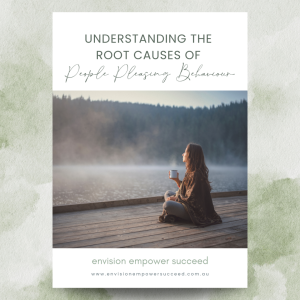Why You’re Always Putting Others First: Uncovering the Reasons About People-Pleasing Behaviour and Its Impact on Your Wellbeing
People-pleasing behaviour is a common yet often misunderstood pattern that can significantly impact an individual’s personal wellbeing. This behaviour involves prioritising others’ needs and desires over one’s own, often to the detriment of personal happiness and mental health. By understanding the roots and causes of people-pleasing, we can begin to address and overcome this behaviour, paving the way for a more balanced and fulfilling life.
The Roots of People-Pleasing Behaviour
People-pleasing behaviour often stems from early life experiences and childhood conditioning. Several factors can contribute to the development of this behaviour:
- Parental Expectations: Growing up in an environment where parental approval was contingent on meeting high expectations can instil a deep-seated need to please others.
- Fear of Rejection: Individuals who have experienced rejection or abandonment may engage in people-pleasing to avoid future rejection and secure acceptance.
- Low Self-Esteem: Those with low self-esteem may believe that their worth is tied to their ability to make others happy, leading them to prioritise others’ needs over their own.
- Cultural and Societal Influences: Cultural norms and societal expectations can reinforce the idea that pleasing others is a virtue, further entrenching this behaviour.
- Trauma and Abuse: Experiences of trauma or abuse can cause individuals to become overly accommodating in an effort to avoid conflict and maintain a sense of safety.
The Impact on Personal Wellbeing
While people-pleasing behaviour may seem harmless or even commendable, it can have serious consequences for personal well-being:
- Emotional Exhaustion: Constantly prioritising others’ needs can lead to emotional burnout and a feeling of being overwhelmed.
- Resentment and Frustration: Suppressing one’s own needs and desires can breed resentment and frustration, both towards oneself and others.
- Loss of Identity: Over time, people-pleasers may lose touch with their own identity, passions, and interests, as they are continually focused on pleasing others.
- Compromised Mental Health: The stress and anxiety associated with people-pleasing can contribute to mental health issues such as depression and anxiety disorders.
- Unhealthy Relationships: People-pleasing can create imbalanced relationships where the individual’s needs are consistently sidelined, leading to feelings of unfulfillment and dissatisfaction.
Breaking Free from People-Pleasing
Recognising and understanding the roots and impacts of people-pleasing behaviour is the first step towards change. Here are some strategies to begin the journey:
- Self-Awareness: Reflect on the underlying reasons for your people-pleasing behaviour and how it affects your life.
- Setting Boundaries: Learn to establish and maintain healthy boundaries to protect your time and energy.
- Building Self-Esteem: Focus on activities and practices that boost your self-esteem and reinforce your intrinsic worth.
- Practising Assertiveness: Develop assertiveness skills to communicate your needs and desires effectively.
- Seeking Support: Consider working with a coach or therapist to explore and address the deep-seated causes of your behaviour.
Call to Action
If you find yourself constantly putting others’ needs before your own and struggling with the consequences of people-pleasing, it’s time to take action. Book a strategy session with me, a spiritual and intuitive life coach dedicated to helping you break free from painful habits and empowering you to live a more balanced and fulfilling life. Together, we can explore the roots of your behaviour, develop effective strategies, and guide you towards a happier, healthier you.
Don’t let people-pleasing control your life any longer. Reach out today to start your transformative journey.








